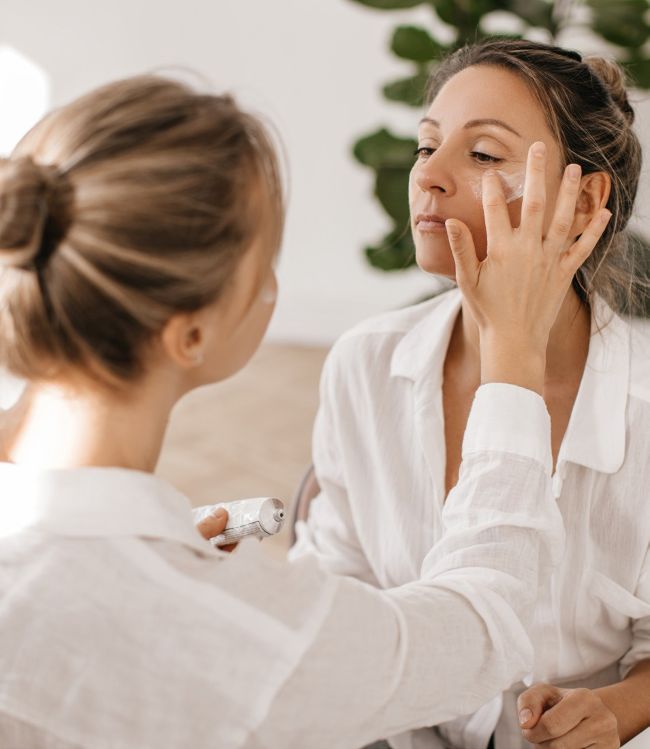INDUSTRY NEWS

Mark Mausenbaum
In memoriam – Mark Mausenbaum
It is with great sadness that Professional Beauty reports on the passing of Mark Mausenbaum, branding manager of Saloncare, who died tragically aged 56 on 3 June, following a long and courageous battle against brain cancer.
Mark joined the industry in June 2017 to assist the all-female team at Saloncare. Whilst he excelled in liaising with suppliers and stock control, company CEO Amanda Harrod (Mark’s wife) felt that his talents were being wasted in these departments. Mark had a marketing diploma under his belt, as well as huge creative flare and owned a casting agency, where he executed all the photography.
Thus, the decision was made to move him to the marketing and branding department.
His skills in social media, passion for photography and his charming and humble personality made him popular in the industry. Mark showed a love for experimenting with all types of cosmetic products, was always keen to attend workshops to broaden his knowledge and remained continuously involved in research.
All of Mark’s valuable contributions started to grow the company’s national and international footprint rapidly. The clients loved his wonderful way of always making them feel important, as well as accommodating them at all hours of the day or night. Amanda and Mark made a powerful duo who accomplished so much together and even more so when joined by their daughter, Miranda.
Mark is survived by Amanda and their three beautiful children.
He will be sorely missed by the health and beauty industry, as well as by the Saloncare team.
Professional Beauty extends its sincere condolences to Mark’s family, friends and colleagues.
It’s all systems go for Professional Beauty Johannesburg
Thousands of industry professionals are expected to visit Africa’s biggest beauty trade show its kind taking place on 3 & 4 September at Gallagher Convention Centre in Midrand.
The Professional Beauty Johannesburg Expo will feature dozens of exhibits from leading suppliers to the beauty, nails, spa and aesthetics sectors. Not only will exhibitors be showcasing their latest wares, but there will be plenty of show specials on offer.
On pages 32 to 36 of this issue of the magazine, we have included a Show Preview, featuring many of the brands that will be exhibiting.
To pre-register for free for Professional Beauty Johannesburg click here https://pbjohannesburg.showhub.live/
The event also incorporates the World Spa & Wellness Convention, a Business Seminars Programme, an Advanced Treatments Stage, the NailFile Nail Competition, the Living Canvas Makeup Competition, and the Salon International Expo for the hairdressing industry.
Salon owners looking to up their skills in terms of running their operations are encouraged to attend the Business Seminars, at R50 per session. The programme can be found on pages 24 and 25.
Top spa executives are included in the speaker line-up at the World Spa & Wellness Convention – to see the programme go to pages 28 and 29. A 2-day pass for the Convention is priced at the Early Bird Special rate of R650 if quoting the discount code – PBWSW. Go to https://pbjohannesburg.showhub.live/event-conference/6470b2 5625bd9c0012ba42a7
Skincare research lacking in equity, finds study
People with darker skin tones represent 40% of the world population and yet only 1% of skincare clinical trials are inclusive, according to new meta-data analysis of research.
The world’s first skin tone research lab has launched to address the worrying lack of skincare research that includes darker skin tones, especially Fitzpatrick IV, V and VI. Those falling into these types require products that specifically target their skin needs.
Skincare brand 4.5.6 Skin’s comprehensive review of skincare research has found that medical training about skin conditions in darker skin is limited, with as many as 60% of dermatologists struggling to diagnose and treat patients with darker skin tones. This is exacerbated by medical textbooks failing to reflect diversity; only 4.5% of images in such texts are diverse.
The review found that the vast priority of the skincare industry (70%) focuses on the main skin concern of lighter phototypes I, II and III, namely anti-ageing. However, that is not necessarily the focus for women of colour. In fact, 90% of the women of colour asked by 4.5.6 Skin said their top priorities were even skin tone and a healthy glow.
In addition, current testing procedures could be causing harm, as regulatory testing currently used by the industry is based on Fitzpatrick skin tones I, II and III only. This means that crucial patch tests are all based on white skin, despite irritation and inflammation appearing differently in darker skin.
For various reasons, clinical trials traditionally tend to include people with lighter skin tones.
In a survey of individuals interested in 4.5.6 Skin, 60% of women of colour reported that they did not confidently understand how to care for their skin. This emphasises a lack of consumer-facing education.
When discussing the different skin tones, most conversations focus completely on colour, but research has shown numerous structural and functional differences in darker skin tones that go beyond that.
Source: https://aestheticmed.co.uk/site/industrynewsdetails/new-research-emphasises-gap-inskincare-equity

Image from Shutterstock
‘Significant growth’ predicted for SA pro skincare market
New research from Mordor Intelligence predicts that the South African professional skincare product market size will grow from $25.08 million in 2023 to $37.90 million by 2028, at a CAGR of 8.61%.
According to the report, the rising demand from women and young consumers is fuelling growth, with multifunctional skincare products that protect the skin from harsh environmental conditions, while promoting even and light skin tones, are currently the most popular. “Additionally, with the expanding middle class and increased purchasing power in various socio-economic categories, there is a demand for cost-effective, highquality skincare products that cater to the needs of different ethnic groups, while also incorporating natural components,” states report.
Mordor notes that key ingredients such as niacinamide and salicylic acid are gaining popularity due to growing concerns about skin problems like acne and eczema among the African population. Pollution and hard water conditions are fuelling the demand for facial cleansers, moisturisers and exfoliators over the forecast period.
Specialty stores and salons offering expert consultations remain the most popular sales channels for professional skincare products.
The market for professional anti-ageing products is experiencing accelerated demand, driven by a rapidly growing demographic looking to prevent wrinkles, sun damage and other signs of diminishing youthfulness.
Three South African-born professional skincare brands are referenced in the report, namely Environ Skincare (Pty) Ltd, Saloncare and Vitaderm.
Source: https://www.mordorintelligence.com/industryreports/south-africa-professional-skincare-productmarket
Possible link between Omega 3 and acne identified
Ninety-four-percent of acne patients in a dermatology study in Germany were found to have below recommended levels of omega-3 fatty acids in their blood.
The dermatologists behind the study believe that this potential link between low omega-3 fatty acid levels and acne could offer new opportunities to help manage the skin condition, thus giving hope to millions of acne sufferers.
Omega-3 fatty acids are key for fighting acne as they reduce inflammation by stimulating the production of anti-inflammatory prostaglandins E1 and E3, leukotriene B5 and lower levels of the insulin-like growth factor (IGF) -1, the central hormone that induces acne.
The team behind the research, based at the Department of Dermatology and Allergy in Munich, also investigated the patients’ diet and found that those who said they regularly consumed pulses, such as chickpeas and lentils, as well as abstaining from sunflower oil, had higher levels of the fatty acid.
Dr Anne Gürtler, the lead author from the team at the Department of Dermatology and Allergy said: “Nutrition plays a pivotal role in the prevention, onset and course of many diseases, including dermatologic disorders such as acne vulgaris.”
Omega-3 fatty acids are found in foods such as legumes, algae, nuts, seeds and non-farmed fish like wild salmon and sardines.
Assistant professor Asli Bilgic said that this research will help get closer to providing effective acne treatment.
Acne has been previously linked to lowered mental health, with 46% of acne patients more likely to develop major depression. https://professionalbeauty.co.uk/site/newsdetails/omega-3-could-be-key-to-acnetreatment
How social media makes young adults feel about their skin
A new study by the Skin Health Alliance reveals that 62% of young adults said social media makes them feel worse about their skin and their appearance.
Seventy-four-percent of respondents feel pressure for their skin to look a certain way.
According to the study, the pervasiveness of edited and filtered images, selective self-presentation and a lack of diversity can lead to feelings of inadequacy and low self-confidence.
“Some 66% of young adults also reported that they have received hate or been bullied due to their appearance. The skin’s appearance can have a huge impact on confidence, with 92% of the young adults surveyed stating that their skin’s appearance is important to their general wellbeing,” states the Skin Health Alliance research.
These figures come from an independent anonymous online survey of 500 young UK residents, aged between 18 and 40, undertaken in July 2023.
Dr Eleanor Chatburn, a clinical psychologist with a special interest in skin conditions, noted, “These new statistics are concerning. They provide a snapshot of the lived experience of the millions of people with skin conditions, which is all too often overlooked, ignored, and even downright dismissed.
“I regularly support patients who describe overwhelming feelings of shame and embarrassment due to the stigma of looking different. We know from the scientific research that people with skin conditions are more likely to develop body image and mental health problems, including anxiety, depression, low self-esteem, and even suicidal ideation.
“A key contributing factor is the toxic beauty standards, so dominant on social media, which promote the idea of ‘flawless’, ‘poreless’, and ‘perfect’ skin. These ideals are not only totally unachievable, they are making people miserable. This is why I believe that social media companies have an obligation to clearly signpost posts that have been edited or use filters, particularly from influencers and brands.”
Source: https://professionalbeauty.co.uk/site/newsdetails/young-adults-social-media-feel-worseabout-skin
Stars get ‘lippy’ at Glastonbury

Maisie Williams at bottom left @maisie_williams
The UK’s biggest and most trendy music festival, Glastonbury, took place recently in Somerset, and the celebs attending the event probably got more media coverage than the performers themselves.
While the typical festival look of super short skirts and/or tiny shorts and wellingtons is usually accompanied by natural beauty looks, as in bare of any make-up at all coupled with sunglasses, some celebs glammed up their faces with lipstick to good effect.

Lily James on left @lilyjamesofficial
‘Queen’s Gambit’ actress Anya Taylor-Joy enhanced her unique looks with deep red lipstick, as did ‘Game of Thrones’ star Maisie Williams. In both instances, the gash of colour contrasted sharply with the stars’ pale complexions.

Gemma Chan @gemmachan
Britain’s current ‘it’ actress, Lily James, opted for a more brownish shade of lipstick, so not as colourful and striking as red, but still fully effective. Actress Gemma Chan went the same route and looked good in the process.

Image from Shutterstock
Study shows link between healthy lifestyle and reverse ageing
A potential reversal of biological age in women following an 8-week methylation-supportive diet and lifestyle program has been observed in new research.
Published in Aging Journal, the researchers involved in the study included Kara N. Fitzgerald; Tish Campbell; Suzanne Makarem; Romilly Hodges; Institute for Functional Medicine; Virginia Commonwealth University; and American Nutrition Association.
In the study, six women completed an 8-week methylation-supportive diet and lifestyle program designed to impact DNA methylation and measures of biological aging. The intervention included diet, sleep, exercise and relaxation guidance, supplemental probiotics and phytonutrients and nutritional coaching.
The study states: “DNA methylation and biological age analysis (Horvath DNAmAge clock (2013), normalized using the SeSAMe pipeline [a]) was conducted on blood samples at baseline and at the end of the 8-week period. Five of the six participants exhibited a biological age reduction of between 1.22 and 11.01 years from their baseline biological age. There was a statistically significant (p=.039) difference in the participants’ mean biological age before (55.83 years) and after (51.23 years) the 8-week diet and lifestyle intervention, with an average decrease of 4.60 years. The average chronological age at the start of the program was 57.9 years and all but one participant had a biological age younger than their chronological age at the start of the program, suggesting that biological age changes were unrelated to disease improvement and instead might be attributed to underlying aging mechanisms.
“Modifiable lifestyle factors, including concentrated exposure to dietary “epinutrients”, have been suggested to be able to favourably influence DNA methylationbased clocks and therefore have the potential to compress morbidity and extend mortality [7]. Epinutrients may be defined as dietary nutrients that provide either substrates or cofactors for DNA methylation activity or influence the expression or rate of activity of DNA methylation-related enzymes. Folate and betaine, for example, are cofactors in methylation biosynthetic pathways, alpha ketoglutarate, vitamin C, and vitamin A are ten-eleven translocation (TET) demethylase cofactors and modulators, and curcumin, epigallocatechin gallate (EGCG), rosmarinic acid, quercetin, and luteolin are known polyphenolic modulators of DNA methyl transferase (DMNT) enzymes [8, 9].
“The modifiable lifestyle intervention used by participants in this case series was first investigated in a pilot clinical trial in which participants (all men between the ages of 50-72 years) reduced their biological age by an average of 3.23 years as compared to controls [7]. The case series reported on herein was conducted to further the investigation of a modifiable lifestyle intervention that was largely the same in other populations; importantly in women.”
The prescribed daily diet in the study included the following: dark leafy greens; cruciferous vegetables; colourful vegetables; pumpkin seeds; sunflower seeds; methylation adaptogens; beets; liver/liver supplement; egg; and 8 cups of water.
Participants were asked to adhere to the following daily ‘health habits’: 30 minutes of exercise; breathing exercises twice a day; at least 7 hours of sleep; and fasting for 12 hours after the meal.
Source: https://www.aging-us.com/article/204602/text